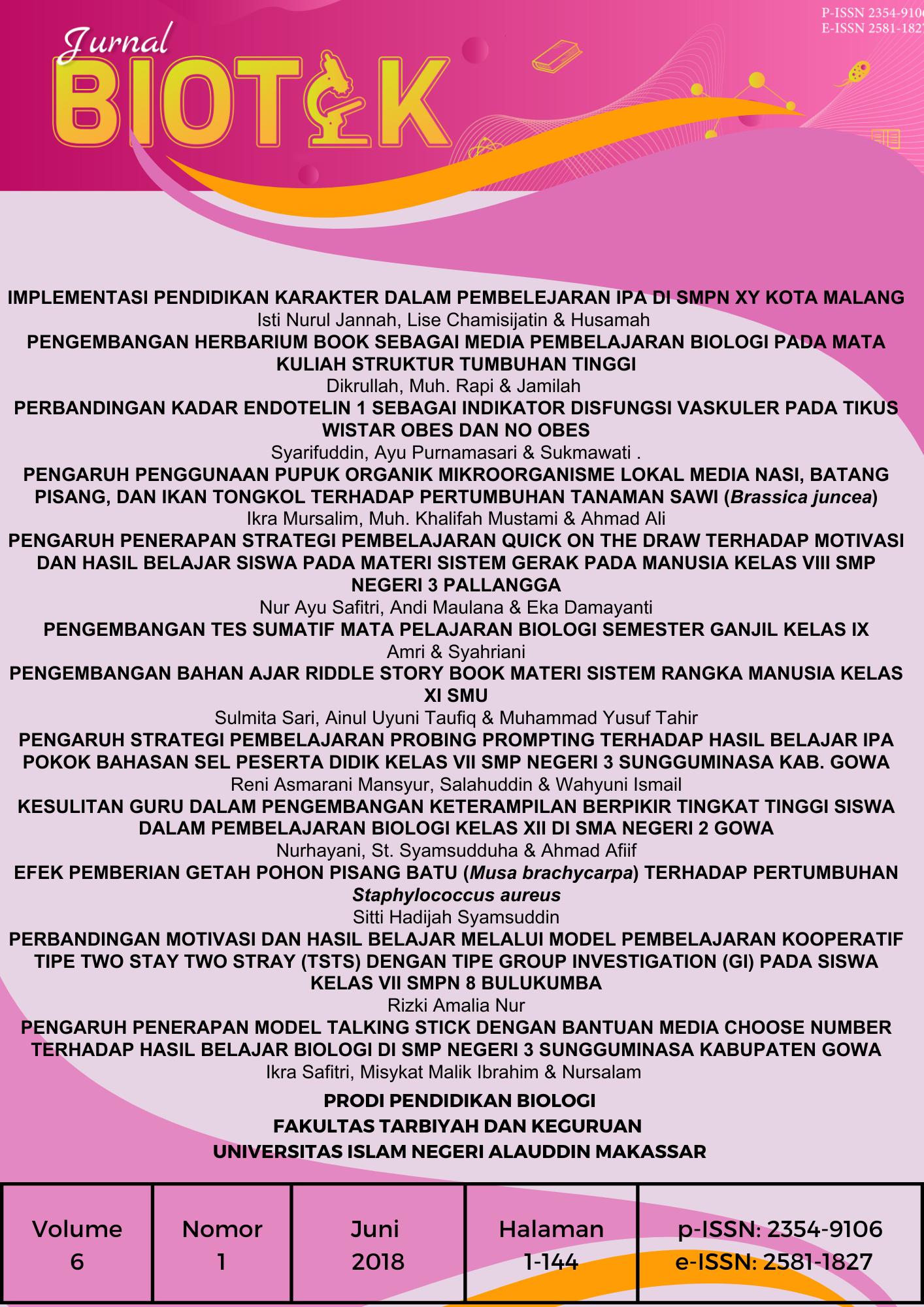PENGARUH STRATEGI PEMBELAJARAN PROBING PROMPTING TERHADAP HASIL BELAJAR IPA POKOK BAHASAN SEL PESERTA DIDIK KELAS VII SMP NEGERI 3 SUNGGUMINASA KAB. GOWA
Abstract
This study aims to (1) know the learning outcomes of science subject of cell learners using learning strategy Probing Prompting class VII students SMPN 3 Sungguminasa Kab. Gowa, (2) to know the learning result of science subject of student cell without using learning strategy of Probing Prompting of class VII SMPN 3 Sungguminasa Kab. Gowa, (3) to know whether there is influence of learning strategy of Probing Prompting to learning result of IPA of cell subject of student class VII SMPN 3 Sungguminasa Kab. Gowa.
This research is Quasi Experimental research with Pretest-Posttest Control Group Design research. The population in this study is all students of class VII SMPN 3 Sungguminasa consisting of 11 classes with the number of students as many as 353 people. The sampling technique used is simple random sampling technique. The sample in this study is class VII J which amounted to 32 students and class VII K which amounted 32 students. Instruments used to determine the larning outcomes of learners in the form of multiple choice test as many as 20 numbers. Data analysis techniques used are descriptive statistical analysis and inferential statistical analysis with t-test.
The results obtained in both groups through descriptive statistical analysis, the average learning outcomes of learners using learning strategy Probing Prompting of = 80,53 whereas the average learning outcomes of group learners without using the strategy of learning Probing Prompting of = 77,06. The result of inferential analysis of data shows that the significance value obtained tcal 4,663 > ttable 1,671 and significance (0,000 < 0,05). So it can be concluded that there is a positive influence of the use of learning strategy Probing Prompting on learning outcomes IPA subject of cell learners class VII SMP Negeri 3 Sungguminasa Kab. Gowa.
Downloads
References
Abdurrahman, Mulyono. Pendidikan Bagi Anak Berkesulitan Belajar. Jakarta: PT Rineka Cipta, 2003.
Gunawan. Efektivitas Penerapan Metode Word Square (WS) dalam Meningkatkan Hasil Belajar Matematika pada Siswa Kelas XI SMAN 11 Makassar. Makassar: Fak. Tarbiyah dan Keguruan UIN alauddin. 2015.
Hajrah, Siti. Efektivitas Model Pembelajaran Aktif Topical Review dalam Meningkatkan Hasil Belajar Mata Pelajaran Biologi Siswa Kelas VIII SMP. Makassar: Fak. Tarbiyah dan Keguruan UIN Alauddin. 2015.
Hamalik, Oemar. Proses Belajar Mengajar. Cet. Pertama ; Jakarta : PT Bumi Aksara, 2001.
Sulisworo, Dwi and Fadiyah Suryani. The Effect of Cooperative Learning, Motivation and Information Technology Literacy to Achievement. Vol 4, No 21 (2014). http://dx.doi.org/10.5296/ijld.v4i2.4908(4 Februari 2017).
Marpaung, Berlian Juni Rosmawati dan Efendi Napitupulu. Pengaruh Strategi Pembelajaran dan Gaya Belajar Terhadap Hasil Belajar Pendidikan Kewarganegaraan. Jurnal Teknologi Pendidikan. Vol 7, No 1 (2014). http://www.jurnal.unimed.ac.id/../1498 (2 Februari 2017).
Mayasari, Yuriska, dkk. Penerapan Teknik Probing Prompting dalam Pembelajaran MatematikaSiswa Kelas VIII MTSN.Jurnal Pendidikan Matematika. Vol 3, No 1 (2014). http://www.ejournal.unp.ac.id/../913 (25 Januari 2017).
Nurhera. Media Pembelajaran Visual dan Audivisual. Makassar: Badan Penerbit Universitas Negeri Makassar. 2010.
Slameto. Belajar dan faktor-faktor yang mempengaruhinya. Jakarta: PT Rineka Cipta. 1991.
Sudijono. Pengantar Evaluasi Pendidikan. Cet. I; Jakarta: Rajagrafindo Persada. 2011.
Sudjana, Nana. Penilaian hasil proses belajar mengajar. Bandung: Remaja Rosdakarya. 1991.
Sugiyono. Metode Penelitian Pendidikan: Pendekatan kuantitatif, kualitatif dan R&D. Bandung: Penerbit Alfabeta, 2015.
Swasono, dkk. Penerapan Pembelajaran Probing Prompting Terhadap Hasil Belajar Peserta Didik pada Materi Lingkaran. Vol 3, No 2 (2014). http://journal.unnes.ac.id/ sju/ index.php/ ujme (3 Februari 2017).
Copyright (c) 2018 Jurnal Biotek

This work is licensed under a Creative Commons Attribution-ShareAlike 4.0 International License.
Authors who publish with Jurnal Biotek agree to the following terms: Authors retain the copyright and grant Universitas Islam Negeri Alauddin Makassar right of first publication with the work simultaneously licensed under a Creative Commons Attribution License (CC BY-SA 4.0) that allows others to share (copy and redistribute the material in any medium or format) and adapt (remix, transform, and build upon the material) the work for any purpose, even commercially with an acknowledgement of the work's authorship and initial publication in Universitas Islam Negeri Alauddin Makassar. Authors are able to enter into separate, additional contractual arrangements for the non-exclusive distribution of the journal's published version of the work (e.g., post it to an institutional repository or publish it in a book), with an acknowledgement of its initial publication in Universitas Islam Negeri Alauddin Makassar. Authors are permitted and encouraged to post their work online (e.g., in institutional repositories or on their website) prior to and during the submission process, as it can lead to productive exchanges, as well as earlier and greater citation of published work (See The Effect of Open Access).

This work is licensed under a Creative Commons Attribution-ShareAlike 4.0 International License.



